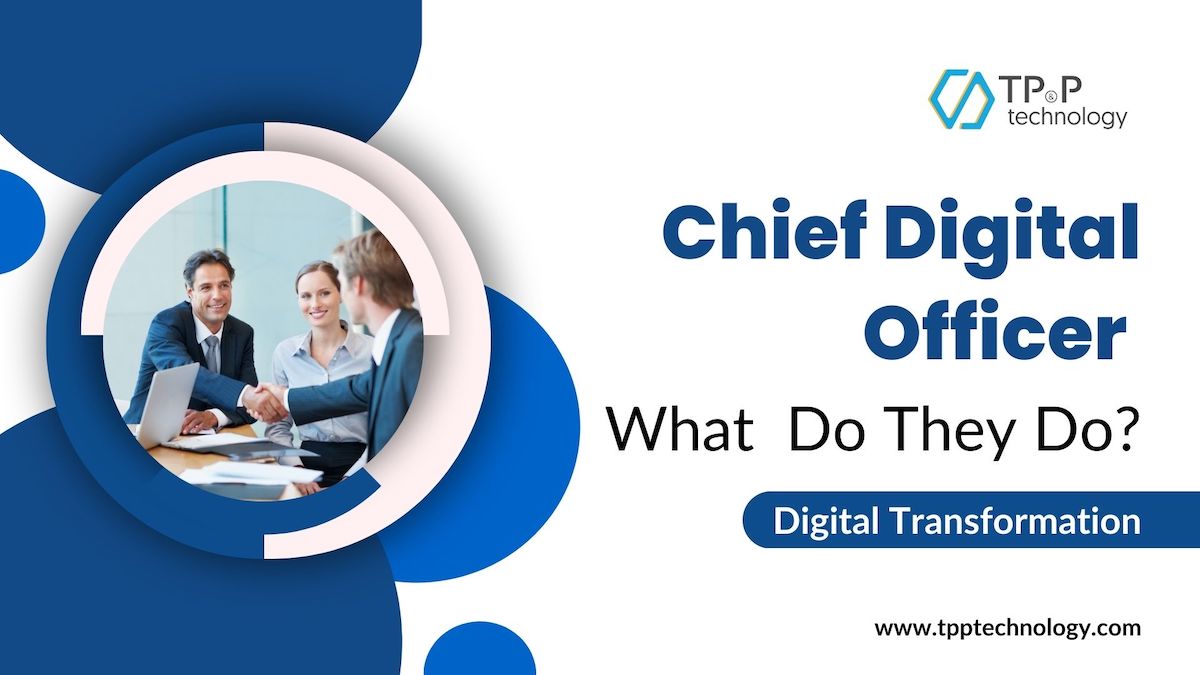
Software Development
16 Jan, 2023
Chief Digital Officers: Who Are They And What Do They Do?
We are in the midst of the Fourth Industrial Revolution, which means that we are going through a digital transformation. It is accompanied by a disruptive technology that is transforming every industry in existence. When it comes to digitally transforming well-established organizations, choosing a leader to guide the enterprise can mean the difference between success and extinction. A Chief Digital Officer (CDO) assists organizations in strategically implementing disruptive technology. How do you become a Chief Digital Officer and aid organizations in their transformation?What Is A Chief Digital Officer?
A Chief Digital Officer (CDO) is an individual who assists a company in driving growth by converting or digitizing traditional 'analog' processes to digital ones using modern technologies and data.This transition, which could be referred to as digital transformation, may involve significant changes to a company's technological architecture, business processes, products, and job roles, and can be time-consuming. Hence, strategic leadership and change management are critical to the change and are spearheaded by the CDOs themselves.
These individuals pay particular attention to creating new value through the smart application of digital tools, platforms, technologies, services, and processes. CDO responsibilities are primarily as follows, but may differ in each organization.
- Recognize the opportunity of emerging digital technologies and digital-enabled business models.
- Build and maintain external relationships with vendors, startups, analysts, and academia, and become a part of relevant ecosystems.
- Act as a thought leader articulating the company's digital future.
- Build digital fluency from the top down by educating the board.
- Make sure that the business strategy is a digital strategy.
- Lead the development of the digital capabilities required for digital transformation across the enterprise.
- Drive the transformation of your organization into an insight-driven organization that enhances the power of data.
- Build digital talent in the organization by developing current employees and attracting new talent.
- Drive the process of identifying, testing, evaluating, and scaling new digital technologies or fail, ensuring they are relevant to the business
- Monitor the implementation of digital initiatives.
CIO vs CDO
A Chief Information Officer (CIO) is typically in charge of an organization's overall IT strategy and the implementation of its technology infrastructure.Here is an overview of the types of tasks that CIOs are in charge of:
- Creating IT and digital-first business strategies
- Managing the acquisition of new IT tools and technologies
- IT service administration
While the CIO is in charge of the technical aspects of digitization, the CDO is in charge of the strategic tasks and direct business connections with the company's overall digitization course. In large corporations, they frequently complement one another's roles.
Who Reports To Whom?
The Chief Digital Officer may report to the CEO, and/or COO, CFO, CTO, CIO, or even the CMO, depending on the job definition, responsibilities, and level of importance.For instance, when the chief digital officer takes on a more visionary role that drives the company's digital future, the CDO may report to the CEO or COO, with other C-level executives possibly reporting to the CDO. If a company needs to integrate new technologies into its financial services processes, the CDO may report to the CFO.
The CDO may report to the CTO in cases requiring technical decisions on products and services. If the CDO is in charge of IT-related processes, they may report to the CIO. The CDO may report to the CMO in companies that are attempting to analyze customer purchasing patterns and improve customer experiences.
What Does A Chief Digital Officer Do?
As previously stated, the CDO's responsibilities are extensive and diverse. Even a cursory look at a few vacancies on online job boards like Indeed will reveal various CDO job descriptions. Not to mention that the role with the same set of functions may have a different name. This is because the position is still relatively new and evolving rapidly. Organizations must be well aware of the key responsibilities that every CDO should handle in order to move beyond vague, ill-defined, or outdated job descriptions.Setting And Implementing Digital Strategy
Before an organization implements digital transformation, a CDO will work with various stakeholders and cross-functional partners and teams, etc. to develop a detailed plan to achieve the digitalization goals, ensuring everyone is on the same page for all relevant digital initiatives. Making a plan before you begin your digital transformation journey will ensure that everything goes smoothly from start to finish.
Business Changes And Adoption
Digital changes mainly require the development of a digital culture. The Chief Digital Officer is the right person for the job. They help the company achieve its digital transformation goals by sharing and embedding its vision across teams. To shape the digitalization of the business and permanently anchor it digitally, CDOs need to consider all areas of the business. Cultural changes also include the introduction of new ways of working and the development of agile skills among employees.
Measuring ROI On Digital Transformation Projects
Digital innovation and transformation initiatives should add value by, for instance, increasing customer engagement and loyalty, driving new revenue, or achieving new efficiencies. Because these outcomes are measurable, the CDO should monitor and report on the ROI outcomes of digital projects and investments, which should be linked to enterprise KPIs, in order to demonstrate the positive impact of these initiatives.
Work with other teams to build and manage a digital ecosystem
A CDO is not a lone wolf going his own way. They are team players first and foremost because if a company wants to go digital, each person on the transformation team should understand how to achieve it and what to do to speed up the process. As a result, a CDO collaborates with teams throughout the organization to develop innovative digital solutions for processes, products, services, marketing channels, customer experience, business models, etc. The CDO traditionally owns and oversees the portfolio of digital innovation projects, while the implementation of individual projects may fall to other leaders and teams.
Identify new technologies to support and enhance existing solutions
The world of technology is constantly and rapidly evolving and new solutions are created every day. As a leader driving change and guiding an organization towards digitization, a CDO must be knowledgeable about emerging technologies to achieve the set goals. CRMs, AI-powered chatbots, and IoT systems are all examples of this.
Developing Digital Team
The demand for innovation and digital transformation currently exceeds the supply of qualified talent in the market and in organizations. Hence, a CDO must work closely with HR to attract and retain the best talent and develop digital skills across the organization.
Chief Digital Officer Skills
The specific skill set requirements for a CDO vary according to the industry in which they work. This must be considered when looking for such a specialist. Let's take a look at the skills and qualifications of a good Chief Digital Officer right now.CDO hard skills and qualifications
Things like business knowledge, deep understanding of digital frameworks, project management experience, and comprehensive know-how in areas like big data, blockchain, AI, IoT, etc. They are important for the CDO to do its job. They form the foundation of a CDO's hard skills.
Business knowledge
The Chief Digital Officer of a company is in charge of the company's digital aspects, such as its website, social media accounts, online marketing, and so on. A Chief Digital Officer with business acumen can better understand a company's needs and how to meet them through digital means. This can assist them in making educated decisions about how to use digital technology to grow a business.
Extensive understanding of digital structures and products.
The CDO's second skin is digital. This specialist investigates new technologies in order to comprehend their impact on business. The CDO is always on the lookout for the next new digital trend and decides whether it is worth a company's time. However, It is critical that the CDO can tell the difference between the real thing and the noise, i.e. distinguish the trendsetting from the irrelevant.
Broad technological awareness
A Chief Digital Officer must be aware of the latest technology and how it can be used to improve a company's operations. They must be able to identify the most effective technology for a business's needs and explain how it can benefit the organization. They must also identify the most effective ways to implement the technology and explain how it can be used to increase productivity.
Project management
As a member of a leadership team, a Chief Digital Officer oversees the development of digital strategies as well as the work of other team members. Project management skills can assist them in delegating tasks, monitoring project progress, and ensuring that all projects are completed on time and within budget.
Data analysis
The ability to interpret large amounts of data is known as data analysis. As a Chief Digital Officer, you may be in charge of analyzing data in order to determine the success of a company's digital initiatives. This could include examining the number of website visitors, online sales, and social media followers. Data analytics can also help you determine which digital strategies work and which don't.
Qualifications and soft skills for CDO
Let’s list the main soft skills contributing to the competence of the CDO.
- Communication: Both internally and externally, the Chief Digital Officer should be able to communicate digital processes and explain the benefits to everyone involved.
- Great sense of responsibility and perseverance: A CDO must be courageous and responsible, and must also demonstrate perseverance to continually drive transformation.
- Leadership: The CDO must be a proven leader with experience developing and managing cross-functional teams. They direct, coordinate, and provide leadership and review the work of professional employees to achieve business plans and results.
- Strategic thinking: CDOs must have extensive experience not only driving IT-based business transformation but also creating digital-first business strategies and innovations. A good CDO is adept at looking from above and focusing the organization and team's efforts on the big picture and effective long-term initiatives.
Who Needs A Chief Digital Officer?
Companies looking for a Chief Digital Officer should begin by assessing their digital risks and opportunities, as well as the current leadership's ability to develop and launch an effective digital business model. According to MIT Sloan School of Management researchers, businesses should ask themselves the following basic questions:- What is the level of digital threat that your organization is facing? (Who are your new online rivals? How do you compare to your industry's digital leader?)
- What is the best digital model for your company if your current business model is under threat? (Do you prioritize operational efficiency or customer satisfaction?)
- What is your current digital-era competitive advantage? (Repeat customers? Large amounts of data accumulated over time?)
- How can the digital age benefit your business? (Does mobile allow you to connect with customers in new ways? Can the Internet of Things be used to improve customer service? How can artificial intelligence improve product recommendations?)
- What muscles do you need to work on to improve your digital dexterity? (Do you need to collaborate with other businesses or industries? Improve your analytical skills?)
Future of the CDO role
Many businesses are in various stages of digital transformation or have yet to begin. According to Enterprise Strategy Group (ESG), a division of TechTarget, one-fourth of organizations are at the maturity level of implementing and optimizing several digital transformation initiatives, while nearly three-fourths are in the process, just beginning, or only planning to digitally transform.Following the COVID-19 pandemic and the resulting disruptions to operations, workforces, and supply chains, younger companies and startups are more likely to be data-driven, while older companies are far more motivated to transform digitally. As more businesses accelerate their digital transformation initiatives in order to maximize their digital assets, add new technologies, and compete at a high level, the evolving role and title of the Chief Digital Officer should gain clarity and importance, as well as face less resistance to change across the board.



